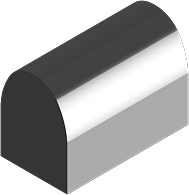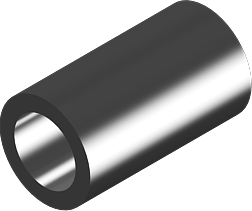Steel HP 9-4-20
View AMS Numbers >
Steel HP 9-4-20
Steel HP 9-4-20 is high-strength steel alloy with a high concentration of cobalt and nickel. It is known to have exceptional fracture toughness which makes it an excellent choice as filler metal for joints of exceptional quality in the aircraft industry, as well as for aircraft structure components such as rocket motor casings, armor plate, pressure vessels, and gears. More precisely, Steel HP 9-4-20 was designed explicitly for the B1-B2 Bomber program. This alloy is also known to have excellent weldability and hardenability.
HP 9-4-20 has a yield strength in the region of 200-205 ksi, but can be brought to 235 ksi with some treatments. That said, if yield strength in the region of 235 ksi is achieved, the fracture toughness falls off quickly. Other desirable properties of HP 9-4-20 are through hardening, Charpy Impact Toughness of 84 ft-lbs, and elongation values of 14-18%.
Tech Steel & Materials offers Steel HP 9-4-20 in three sub-type specifications and multiple shapes/forms:
Chemical Composition of Steel HP 9-4-20
| Element | min | max |
| Carbon | 0.17 | 0.23 |
| Manganese | 0.20 | 0.40 |
| Silicon | — | 0.20 |
| Phosphorus | — | 0.010 |
| Sulfur | — | 0.010 |
| Chromium | 0.65 | 0.85 |
| Nickel | 8.50 | 9.50 |
| Cobalt | 4.25 | 4.75 |
| Molybdenum | 0.90 | 1.10 |
| Vanadium | 0.06 | 0.12 |
| Iron | — | *Balance |
*Not exclusively to the element mentioned, but that one predominates other elements that are used only in minimal quantities.
Fabrication and Working Instructions
Steel HP 9-4-20 possesses excellent weldability. However, it can’t be appropriately welded using most methods. For best results, Helium-shielded TIG welding is the preferred method, using the AMS 6458 welding wire specification of HP 9-4-20. The properties of the weld are yield strength in excess of 239 ksi and a density of 7.76 gm/cc.
Steel HP 9-4-20 is relatively easy to machine and doesn’t produce a lot of tool wear, even after large surface areas were machined. For example, in a technical report by T. O. Morris, it was shown that areas as large as 1.75 m2 were machined to acceptable tool-wear levels. The same report says that it would be complicated to achieve the same degree of efficiency can’t be made with maraging steels that have similar strength and toughness.
Forging of HP 9-4-20 is done when the block of steel is heated to 2250° F (1230° C), and then finished at 1950° F (1065° C). This alloys should not be forged below temperatures of 1700° F (925° C). After the forging is finished, the parts can be annealed.
Mechanical Properties of HP 4-9-20 (Minimum Tensile)
| Property | Value |
| Tensile Strength | 190 ksi |
| Yield Strength at 0.2% Offset | 180 ksi |
| Elongation in 4D | 12% |
| Reduction of Area | 45% |
Range of Products
| Product Type | Products | Dimension | Processes | Delivery Status |
| Plates / Sheets | Plates / Sheets | 0.08-200mm (T)*W*L | Forging, hot rolling, and cold rolling | Annealed, Solution and Aging, Q+T, ACID-WASHED, Shot Blasting |
| Steel Bar | Round Bar, Flat Bar, Square bar | Φ8-1200mm*L | Forging, hot rolling and cold rolling, Cast | Black, Rough Turning, Shot Blasting |
| Strip | Steel Coil / Steel Strip | 0.03-16.0 x 1200mm | Cold-Rolled & Hot-Rolled | Annealed, Solution and Aging, Q+T, ACID-WASHED, Shot Blasting |
| Tubes | Seamless Pipes / Tubes, Welded Pipes / Tubes | OD:6-219mm x WT:0.5-20.0mm | Hot extrusion, Cold Drawn, Welded | Annealed, Solution and Aging, Q+T, ACID-WASHED |
Heat Treatment
Annealing of HP 9-4-20 is done for 4 hours at a temperature of 1300°F (705°C). Then, air cooling is recommended down to room temperature, and reheating to 1150°F (620°C) for 4-8 hours and air cool again to room temperature. For sub-critical anneal the second step can be done at 1150°F (620°C), but for longer (12-24 hours), followed by air cooling to room temperature.
Normalizing of HP 9-4-20 is done at 1650-1750°F (900-955°C) for one hour. Then, the part should be air cooled to room temperature.
Hardening and tempering must always be done after normalizing. Hardening is carried out at 1550-1600°F (845-870°C) for one hour and cooled with oil quenching, while tempering is carried out at 400-1100°F (205-595°C). If austenite is present after hardening, refrigeration can be used to remove it. Cool the part down to -100°F (-73°C) for 2 hours and then air-warm it to achieve room temperature.
Select AMS Number:
| AMS Number | Alloy | Type | UNS | Cross Ref. Spec | Misc./Shape | |
|---|---|---|---|---|---|---|
| AMS 6468 |
HP 9-4-20 | Steel | K91461 | - | Wire |
 |
| AMS 6523 Plate | HP 9-4-20 | Steel | K91472 | - | Plate |
 |
| AMS 6523 Sheet | HP 9-4-20 | Steel | K91472 | - | Sheet |
 |
| AMS 6523 Strip | HP 9-4-20 | Steel | K91472 | - | Strip |
 |
| AMS 6525 Bar | HP 9-4-20 | Steel | K91472 | - | Bar |
 |
| AMS 6525 Forging | HP 9-4-20 | Steel | K91472 | - | Forging |
 |
| AMS 6525 Ring | HP 9-4-20 | Steel | K91472 | - | Ring |
 |
| AMS 6525 Tubing | HP 9-4-20 | Steel | K91472 | - | Tubing |
 |

 Tech Steel & Materials
Tech Steel & Materials